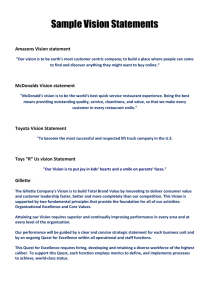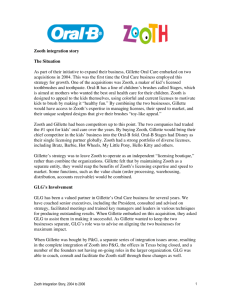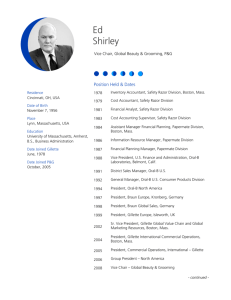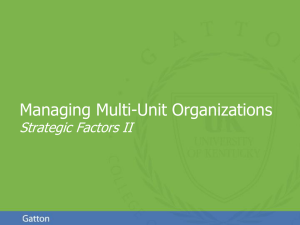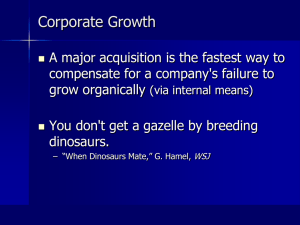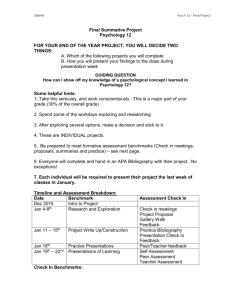Gillette's Prescription for International Business Success: In
advertisement
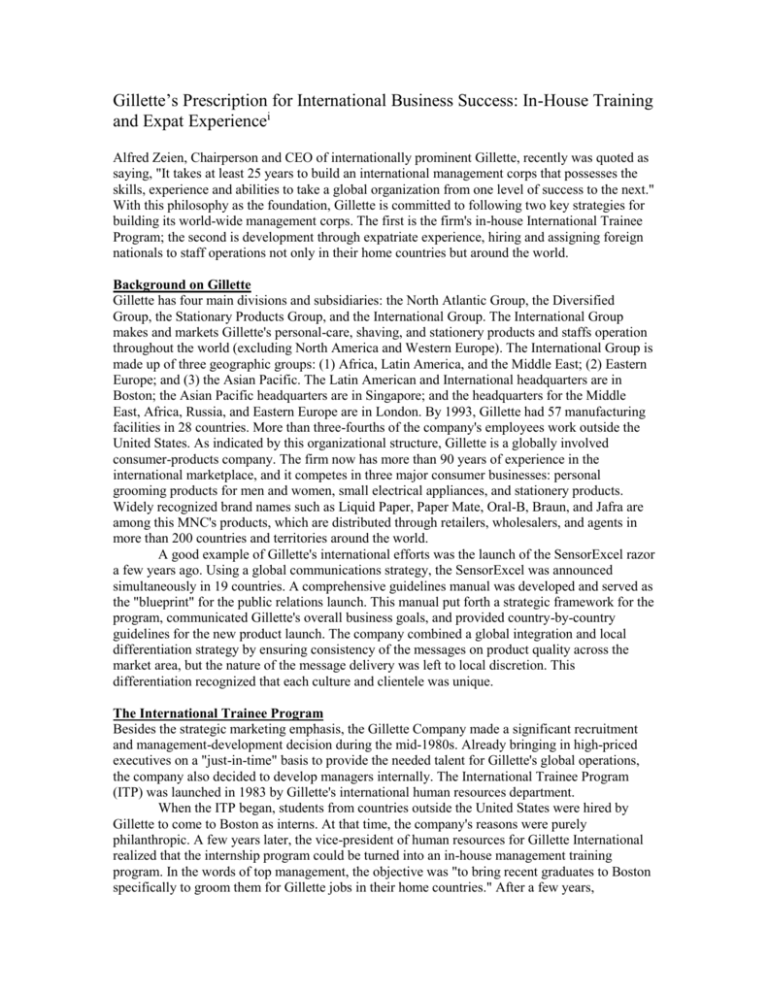
Gillette’s Prescription for International Business Success: In-House Training and Expat Experiencei Alfred Zeien, Chairperson and CEO of internationally prominent Gillette, recently was quoted as saying, "It takes at least 25 years to build an international management corps that possesses the skills, experience and abilities to take a global organization from one level of success to the next." With this philosophy as the foundation, Gillette is committed to following two key strategies for building its world-wide management corps. The first is the firm's in-house International Trainee Program; the second is development through expatriate experience, hiring and assigning foreign nationals to staff operations not only in their home countries but around the world. Background on Gillette Gillette has four main divisions and subsidiaries: the North Atlantic Group, the Diversified Group, the Stationary Products Group, and the International Group. The International Group makes and markets Gillette's personal-care, shaving, and stationery products and staffs operation throughout the world (excluding North America and Western Europe). The International Group is made up of three geographic groups: (1) Africa, Latin America, and the Middle East; (2) Eastern Europe; and (3) the Asian Pacific. The Latin American and International headquarters are in Boston; the Asian Pacific headquarters are in Singapore; and the headquarters for the Middle East, Africa, Russia, and Eastern Europe are in London. By 1993, Gillette had 57 manufacturing facilities in 28 countries. More than three-fourths of the company's employees work outside the United States. As indicated by this organizational structure, Gillette is a globally involved consumer-products company. The firm now has more than 90 years of experience in the international marketplace, and it competes in three major consumer businesses: personal grooming products for men and women, small electrical appliances, and stationery products. Widely recognized brand names such as Liquid Paper, Paper Mate, Oral-B, Braun, and Jafra are among this MNC's products, which are distributed through retailers, wholesalers, and agents in more than 200 countries and territories around the world. A good example of Gillette's international efforts was the launch of the SensorExcel razor a few years ago. Using a global communications strategy, the SensorExcel was announced simultaneously in 19 countries. A comprehensive guidelines manual was developed and served as the "blueprint" for the public relations launch. This manual put forth a strategic framework for the program, communicated Gillette's overall business goals, and provided country-by-country guidelines for the new product launch. The company combined a global integration and local differentiation strategy by ensuring consistency of the messages on product quality across the market area, but the nature of the message delivery was left to local discretion. This differentiation recognized that each culture and clientele was unique. The International Trainee Program Besides the strategic marketing emphasis, the Gillette Company made a significant recruitment and management-development decision during the mid-1980s. Already bringing in high-priced executives on a "just-in-time" basis to provide the needed talent for Gillette's global operations, the company also decided to develop managers internally. The International Trainee Program (ITP) was launched in 1983 by Gillette's international human resources department. When the ITP began, students from countries outside the United States were hired by Gillette to come to Boston as interns. At that time, the company's reasons were purely philanthropic. A few years later, the vice-president of human resources for Gillette International realized that the internship program could be turned into an in-house management training program. In the words of top management, the objective was "to bring recent graduates to Boston specifically to groom them for Gillette jobs in their home countries." After a few years, responsibility for identifying foreign students was moved from an outside international studentexchange program to the human resources director and general manager for each of Gillette's worldwide operations. Each manager was responsible for identifying the top business students in prestigious universities internationally, who were to be recruited into the program. The approach taken by the ITP is representative of Gillette's regiocentric approach to international management. In international operations, Gillette relies on managers from a particular geographic region to handle things in and around that location. The regiocentric approach also guides the manner in which training is set up. On entering Gillette's program, junior trainees typically work for 6 months at the Gillette subsidiary in their home country. Gillette corporate management then may choose to transfer them to one of the company's three international headquarters: Boston, London, or Singapore. These assignments usually last for 18 months and depend on which world region their subsidiaries fall into. The trainee program basically is the same in each location; however, Boston (where the program originated) has more trainees than either London or Singapore. Gillette's international trainee program and on-site training programs both have personal and organizational objectives. At a personal level, Gillette provides the training and direct experience to improve the management trainee's ability to interact effectively with the local people at foreign operations and, in particular, with their own direct reports. Such training not only enhances the individual's competitiveness and marketability within Gillette but also with other companies. Gillette generally extends permanent job offers to nine of every ten trainees who go through the ITP. Eight of the nine usually accept, and six of these stay with the firm longer than a year after returning to their home countries. Although graduates often receive other job offers at higher salaries, Gillette has been successful in keeping its graduates. In the first 10 years, 113 trainees went through the program, and over one-half are still with the company. Besides the personal benefits from the training, the company also clearly benefits. For example, trainees note that they are much more willing to communicate with headquarters and other operations, because they know people at the home office and understand how things work at other facilities around the world. The trainees also gain an appreciation for different ways of doing things during their training. Most enter the program having only limited experience with people and customs from cultures other than their own. After living and working for a year and a half with people from different cultures, the trainees naturally emerge as more open-minded managers and take this with them wherever they go on their permanent assignment. The international-trainee program costs Gillette $20,000 to $25,000 per trainee per year. However, expatriates sent to overseas assignments can end up costing much more. In Boston alone, the total trainee-program budget is about $1 million per year; however, the firm estimates that only three expatriates could be hired for that amount. The head of international human resources feels that the cost of the ITP is worth it to Gillette even though it may take longer to develop managers this way. He states, "This is the core of our international recruiting. All of our efforts and resources are directed toward this program." After completing their 18-month terms, trainees return to their home countries to take entry-level manager positions. If they show continued success, they usually will move on to assignments in other countries, ultimately returning to their home countries as general managers or senior operating managers. For example, many ITP graduates of several years ago now hold mid- to senior-level management positions. Gillette looks to ITP graduates beyond expatriate assignments; they are slated to be this MNC's future senior international leaders. Development through Expatriate Experience Besides the in-house ITP, Gillette also provides expatriate experience to its managers. For example, about 80 percent of the 40 top executives have had at least one foreign assignment, and more than 50 percent have worked in at least three countries. In 1993 alone, 269 Gillette employees were on expatriate assignments, representing 38 home countries and 47 host countries. A very large majority of Gillette's expatriates come from one of the other 27 countries in which the company has operations. Most of the time, Gillette hires foreign nationals to staff management positions in countries other than the United States. Often, these individuals are first identified while studying at U.S. universities for their MBAs. On a training track similar to those in the company's international trainee program, these new hires typically work for a year at Gillette's Boston headquarters and then return to a Gillette subsidiary in their home country. Then, after working in their home countries for approximately 4 years, these managers usually are moved to other countries and assignments. A major side benefit of Gillette managers gaining such broad international experience is that as they do so, they teach and develop other potential managers within the organization. Managers with international experience often are prime candidates for positions that open when Gillette enters joint ventures or new markets. A good example is the joint venture that Gillette undertook with a company in China. Gillette began planning this alliance more than 4 years before it solidified and actually occurred. Importantly, Gillette began identifying individual managers who would be right for assignments in the China business early in the process. Gillette knew that managers who had Chinese experience had to be pulled from other countries, such as Australia, England, and France, but also that others in the company with relevant experience would then have to move into the positions these people left behind. Chairman and CEO Zeien recently told his shareholders: "I contend that the transferability of management is the glue that holds the various parts of the company together." And Dieu Eng Seng, area vice-president of Oral-B, Asia Pacific, echoed this philosophy and that of his Gillette management colleagues in saying, “One of my key objectives is to identify, recruit and develop competent managers. I’m confident that these good people will generate a flow of business growth and profits for the future.” SOURCE: Hodgetts, Richard M., and Fred Luthans. “Gillette’s Prescription for International Business Success: In-House Training and Expat Experience.” International Management: Culture, Strategy, and Behavior. Boston, McGraw-Hill: 2000. 530-2. i
